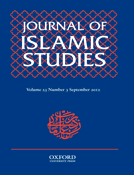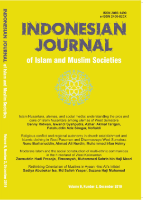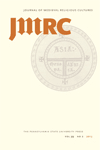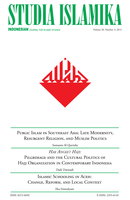
Journal of Al-Tamaddun
Scope & Guideline
Advancing Knowledge Through Interdisciplinary Dialogue
Introduction
Aims and Scopes
- Interdisciplinary Islamic Studies:
The journal publishes research that intersects various disciplines such as history, sociology, political science, and religious studies, contributing to a nuanced understanding of Islamic civilization. - Cultural and Historical Analysis:
A significant focus is placed on the historical development of Islamic societies, cultural practices, and their impacts on contemporary issues. - Regional Focus on Southeast Asia:
The journal emphasizes studies that pertain to Southeast Asian Islamic history and culture, exploring local contexts and their global connections. - Contemporary Issues in Islam:
Research on modern challenges faced by Muslim communities, including Islamophobia, identity politics, and the role of Islam in governance and social justice. - Methodological Diversity:
The journal encourages diverse methodologies, including qualitative, quantitative, and critical approaches to enrich the academic discourse surrounding Islamic studies.
Trending and Emerging
- Islam and Identity Politics:
There is an increasing focus on how Islamic identity is constructed and perceived within multicultural societies, particularly in relation to Islamophobia and social integration. - Islam and Social Justice:
Research addressing the role of Islam in promoting social justice, rights, and ethical governance is becoming more prominent, reflecting current global movements for equality. - Interfaith Dialogue and Multiculturalism:
Emerging studies emphasize the importance of interfaith dialogues and multicultural interactions, particularly in regions experiencing religious pluralism. - Impact of Modern Technology on Islam:
The influence of digital media and technology on Islamic practices, education, and community engagement is gaining traction, highlighting the adaptation of Islam in the digital age. - Post-Colonial Studies in Islamic Contexts:
There is a noticeable increase in research exploring post-colonial themes and their implications for contemporary Islamic thought and practice, particularly in Southeast Asia.
Declining or Waning
- Classical Islamic Governance:
Topics related to classical governance models and their historical implications are less frequently addressed, indicating a possible shift towards contemporary governance issues. - Traditional Religious Practices:
There is a noticeable decrease in research focused solely on traditional religious practices, suggesting a broader interest in how these practices adapt to modern contexts. - Historical Narratives of Islamic Conquests:
The exploration of historical conquests and military campaigns in Islamic history is declining, possibly overshadowed by more pressing contemporary socio-political discussions. - Focus on Islamic Philosophy:
While still relevant, the emphasis on classical Islamic philosophy and its historical figures appears to be waning in favor of practical applications of Islamic teachings in modern society. - Cultural Heritage Studies:
Although cultural heritage remains important, specific studies on historical artifacts and their significance are becoming less prevalent, reflecting a shift towards thematic and contextual analyses.
Similar Journals

Islamic Law and Society
Exploring the Intersections of Law and SocietyIslamic Law and Society, published by BRILL, is a distinguished academic journal that has been bridging the gap between legal studies and socio-political discourse since its inception in 1994. With an ISSN of 0928-9380 and an E-ISSN of 1568-5195, the journal is recognized for its scholarly contributions in the fields of Law, Sociology, and Political Science, boasting a notable impact factor that positions it within the Q2 category in Law and Q3 in Sociology and Political Science as of 2023. Situated in the Netherlands, it is committed to publishing high-quality, peer-reviewed research that explores the intricate relationship between Islamic legal traditions and contemporary societal issues. The journal's indexed rankings in Scopus reflect its relevance, ranking #502 out of 1025 in Law and #844 out of 1466 in Sociology and Political Science. This makes it an essential resource for researchers, professionals, and students seeking to gain insights into the complexities of Islamic law within global contexts. The journal is accessible through various academic databases, offering a platform for interdisciplinary engagement and research dissemination, crucial for those invested in the dynamics of law and society.

Al-Shajarah
Fostering Insightful Discourse on Islamic CivilizationsAl-Shajarah is an esteemed academic journal that serves as a vital platform for scholarly discourse in the fields of Cultural Studies, History, Philosophy, and Religious Studies. Published by the International Islamic University Malaysia and the International Institute of Islamic Thought and Civilization, the journal reflects a profound commitment to advancing understanding and dialogue surrounding Islamic thought and its place in modern society. With an ISSN of 1394-6870 and an evolving publication history since its convergence in 2011, Al-Shajarah offers valuable insights that cater to a broad array of readers, from seasoned researchers to emerging academics. The journal's rigorous peer-review process and commitment to cultural and religious scholarship are underscored by its categorization in the Q3 and Q4 quartiles in critical academic fields, and its Scopus rankings demonstrate its relevance within the global academic landscape. While open access is not currently available, Al-Shajarah remains a crucial resource for those seeking to enrich their understanding of Islamic civilizations and philosophy, providing access to pioneering research that shapes the conversation within these disciplines.

Bilimname
Shaping the Future of Islamic Studies Through Open AccessBilimname is a distinguished academic journal published by the ILAHIYAT BILIMLERI ARASTIRMA VAKFI, dedicated to advancing knowledge in the fields of Islamic studies, theology, and social sciences. With its E-ISSN: 2148-5860, this open-access journal provides a platform for researchers, scholars, and students alike to publish and share innovative ideas and groundbreaking research. While specific metrics such as H-Index and Scopus ranks are currently unavailable, Bilimname continues to foster academic discourse and engagement, making it an essential resource for individuals keen on exploring contemporary issues within its scope. Located in Kayseri, Turkey, the journal aims to bridge theoretical insights with practical applications, thereby contributing significantly to the academic community and shaping future research in relevant disciplines.

Journal of Islamic Studies
Navigating the Complexity of Islamic Culture and LiteratureJournal of Islamic Studies, published by Oxford University Press, serves as a pivotal platform for the dissemination of research in the dynamic fields of Islamic culture, history, and literature. With an ISSN of 0955-2340 and an E-ISSN of 1471-6917, this esteemed journal has established itself within the upper echelons of academic scholarship, holding a Q1 ranking in Cultural Studies, History, Literature and Literary Theory, and Religious Studies as of 2023. Its distinguished standing among peers is further evidenced by Scopus rankings that place it within the 97th percentile for Literature and Literary Theory and the 91st percentile for both Religious Studies and History. Aimed at researchers, professionals, and students alike, the journal spans a broad temporal focus from 1990 to 1996 and continues from 2009 to 2024, nurturing vital discourse on Islamic studies without the barrier of open access. With its rich repository of articles, the Journal of Islamic Studies remains an essential source for advancing understanding and scholarship in a rapidly evolving academic landscape.

Contemporary Islam-Dynamics of Muslim Life
Advancing Knowledge on Modern Muslim ExperiencesContemporary Islam: Dynamics of Muslim Life, a distinguished journal published by SPRINGER, serves as a vital platform for scholarly discourse in the fields of Cultural Studies and Religious Studies, where it proudly holds a Q1 ranking in both categories as of 2023. With an impressive impact factor that reflects its robust academic contributions, the journal is positioned within the 94th percentile in Religious Studies and the 86th percentile in Cultural Studies on Scopus, highlighting its relevance and influence in contemporary research. Access to its cutting-edge articles, rigorously peer-reviewed, is vital for researchers, professionals, and students seeking to comprehend the multifaceted dynamics of Muslim life across various contexts. Established in 2007 and continuing through 2024, this journal not only provides invaluable insights into Muslim communities but also addresses broader social and cultural phenomena, making it an essential resource for anyone interested in understanding the contemporary Islamic landscape.

Indonesian Journal of Islam and Muslim Societies
Advancing scholarly discourse on Islam and society.Indonesian Journal of Islam and Muslim Societies (IJIMS) is a leading platform for scholarly discourse in the fields of Islamic studies and social sciences, published by INST AGAMA ISLAM NEGERI-IAIN SALATIGA. Since its establishment in 2011, IJIMS has been dedicated to advancing the understanding of Islamic culture, society, and politics, with an impressive impact reflected in its Q1 ranking in Religious Studies and Q2 in Sociology and Political Science as of 2023. The journal not only ranks among the top in the Scopus database, occupying the 19th position in the Arts and Humanities—Religious Studies category, but it also offers open access to its content, making it readily available to a global audience. This commitment to accessibility ensures that researchers, students, and professionals can engage with high-quality research that informs and shapes contemporary dialogue on Islam and Muslim societies. With a convergence of rich academic contributions through to 2024, IJIMS stands as a vital resource for those looking to explore the complexities of Islam in a modern context.

Turkish Journal of Islamic Economics-TUJISE
Advancing Islamic Finance through Scholarly InsightWelcome to the Turkish Journal of Islamic Economics (TUJISE), a premier platform for scholarly discourse in the field of Islamic economics and finance. Published by the RESEARCH CENTER ISLAMIC ECONOMICS-IKAM, this journal has been committed to advancing knowledge and innovation since it transitioned to an Open Access format in 2014, ensuring that critical research is accessible to a global audience. TUJISE is dedicated to providing a comprehensive exploration of topics such as ethical banking, development finance, and socio-economic theories rooted in Islamic principles, aiming to bridge gaps between mainstream economics and Islamic traditions. Our journal is positioned as a vital resource for researchers, practitioners, and students alike, seeking to contribute to the growing body of knowledge in Islamic economics. Its inclusive nature and commitment to quality research uphold the highest academic standards, making TUJISE an essential tool for anyone interested in the dynamics of Islamic financial systems and their implications in today's economy.

Journal of Medieval Religious Cultures
Unveiling Insights: Where Religion Meets Culture in the Middle AgesJournal of Medieval Religious Cultures, published by Penn State University Press, stands as a vital resource for scholars in the fields of History and Religious Studies. With its ISSN 1947-6566 and E-ISSN 2153-9650, this journal provides a platform for high-quality research focused on the intersections of religion, culture, and society during the medieval period. Its current impact factor underscores its relevance and citation frequency in academic circles, solidifying its position in the Q3 quartile for both categories as of 2023. The journal's commitment to fostering scholarly dialogue makes it an essential read for researchers, professionals, and students alike, exploring topics that shape our understanding of medieval religious practices and beliefs. Although it does not offer open access, the journal ensures that its contributions are accessible through various academic libraries, facilitating valuable insights into a pivotal era of history. Explore the latest findings and engage with leading scholarship published from 2014 to 2024 at Penn State University Press.

Studia Islamika
Illuminating the intersections of faith, society, and scholarship.Studia Islamika is a distinguished academic journal published by the Syarif Hidayatullah State Islamic University Jakarta, specifically through the Center for Study Islamic & Society. Established in 1994, this journal has rapidly evolved to become a pivotal platform for advancing scholarly dialogue in the field of Islamic Studies. With a notable impact factor and categorized in the prestigious Q2 quartile of Religious Studies as of 2023, it emphasizes the critical examination of Islamic thought, culture, and sociopolitical contexts. The journal's issues span from 1994 to present, featuring innovative research that engages with contemporary challenges in Muslim societies. Although it does not currently offer open access, its rigorous peer-review process ensures high-quality research contributions. Researchers, professionals, and students alike will find Studia Islamika to be an invaluable resource for enhancing their understanding of the multifaceted dynamics within Islamic traditions and their implications in today's world.

Oriens
Exploring the Nexus of Culture, Philosophy, and ReligionOriens is a distinguished academic journal published by BRILL, based in the Netherlands, focusing on the interdisciplinary integration of Cultural Studies, Philosophy, and Religious Studies. With an ISSN of 0078-6527 and E-ISSN of 1877-8372, it has established its presence since 2009 and continues to provide a vital platform for scholarly discourse through 2024. Recognized in the Q3 quartile for all three fields, the journal boasts impressive Scopus ranking positions, such as 75th out of 644 in Religious Studies, placing it in the top 12% percentile of its category. This makes Oriens an invaluable resource for researchers, professionals, and students seeking to explore significant themes and developments in these areas. While the journal is not open access, its subscription model ensures high-quality, peer-reviewed content that contributes significantly to the existing body of knowledge. By fostering a critical dialogue among diverse scholarly perspectives, Oriens remains an important conduit for advancing interdisciplinary insights and cultural understanding.